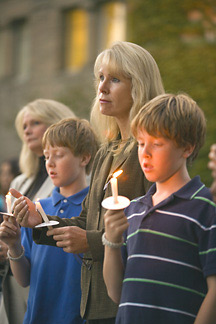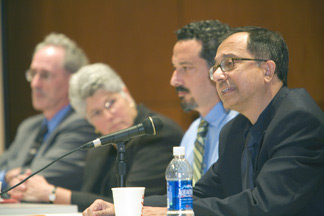Remembering Sept. 11, five years later
By Lauren Gold
On Sept. 11, 1906, Mahatma Gandhi launched his peaceful campaign against injustices toward Indians in South Africa.
It is not the event we normally associate with Sept. 11. But on a day of remembering the victims of the Sept. 11, 2001, terrorist attacks, speakers at Cornell's Kennedy Hall asked audience members to consider Gandhi's example in the context of today's violent world.

"An eye for an eye," said Kaushik Basu, the C. Marks Professor of International Studies and professor of economics at Cornell, quoting Gandhi, "leaves the world blind."
Dozens of Cornellians and Ithacans gathered on Monday evening for a panel discussion and candlelight vigil marking the fifth anniversary of the attacks. Cornell President David Skorton led the event, which was organized by David Harris, vice provost for the social sciences and professor of sociology.
"This is one talk I did not want to give," said Basu. "Our natural instinct is to be silent. But we have to think and speak in honor of the lives lost."
On the panel with Basu were David S. Powers, professor of Near Eastern studies; Shelley Feldman, professor of development sociology; and Eric Tagliacozzo, assistant professor of history.
The event opened with the taped remarks of Walter LaFeber, Cornell's Andrew H. and James S. Tisch Distinguished University Professor, to the Cornell community on Sept. 14, 2001; and with a reading by executive assistant Dan Gurvich of the words of Henry Shue, professor of philosophy, who spoke three days after LaFeber during a universitywide teach-in.
LaFeber spoke in 2001 about the changing nature of governments and societies; he urged Americans to help guide change in a positive direction. We have a sacred responsibility, he said then, to uphold human rights and remain true to the fundamental values of tolerance and understanding. Shue called the attack a massacre, but said it "does not entitle us to go around the world inflicting indiscriminate harm on others." He called for alternative sources of hope to keep the vulnerable and hopeless from resorting to terrorism.
Basu offered perspective from South Asia, where conflict has flared and ebbed in recent history.
"Governments fighting terrorists can be so single minded in counting the number of terrorists killed, without counting the number born -- sometimes by the same act," said Basu. He highlighted violence in India that followed the assassination of Prime Minister Indira Gandhi on Oct. 31, 1984, and cited a policy of "relentless inclusion" of Sikhs and other groups in Indian government from that point on -- a policy, he said, that contributed to the resolution of that conflict.
Bonnie McEneaney '78, wife of the late Eamon McEneaney, '77, a Cantor Fitzgerald senior vice president who died in the World Trade Center attack, gave the final remarks. She spoke of the importance of spirituality, hope, love and togetherness. "I take great comfort in knowing that when [Eamon] faced his final moments he was not alone," she said.

Finally, members of the Cornell lacrosse team presented McEneany with flowers and keepsakes in tribute to her husband, who was a star Cornell lacrosse player. Then McEneany and her twin 11-year-old sons joined the audience of about 80 people in a walk -- by candlelight and to the music of bagpipes -- to Ho Plaza.
As dusk fell, they listened to the music of the Cornell Glee Club and a "litany of remembrance and hope" read by members of Cornell United Religious Work.
Sabrina Imam, a sophomore in the College of Arts and Sciences, said the event, especially the words of McEneany, left her feeling more connected to the tragedy than she had been before. "I had never seen anyone speak that movingly," she said. "It makes you want to be aware of everything going on in your world."
Media Contact
Get Cornell news delivered right to your inbox.
Subscribe